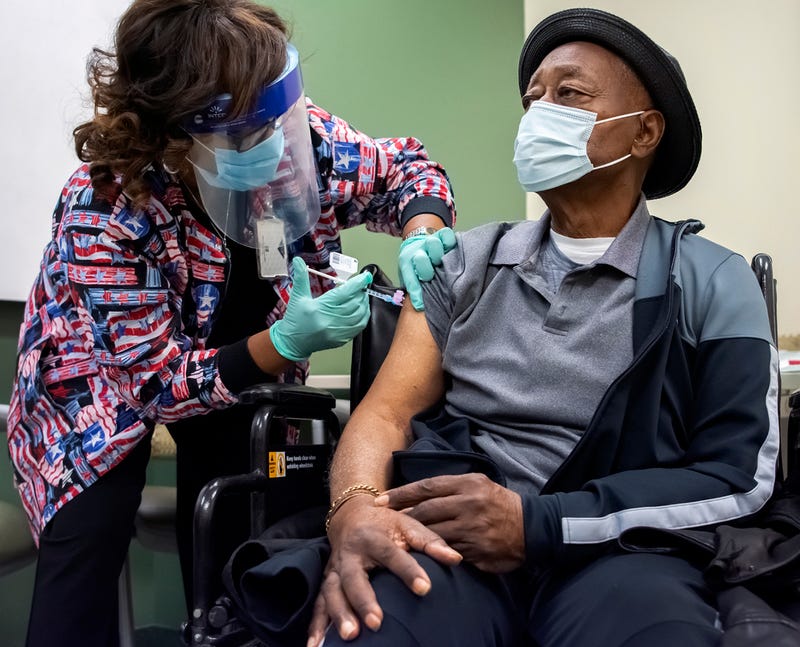
The Department of Veterans Affairs is expecting a significant jump in the number of coronavirus vaccine doses it receives from the Department of Health and Human Services next week.
VA has been receiving roughly 125,000 doses per week recently, Acting Undersecretary for Health Dr. Richard Stone told senators on Wednesday. Just before Stone testified before the Senate Veterans Affairs Committee Wednesday, however, he said VA leaders learned the department will receive about 600,000 doses -- nearly five times the amount it received in recent weeks.
VA has the capacity to deliver 300,000 to 600,000 vaccine doses per week, Stone told lawmakers, but severely limited supply has frustrated the department's efforts to deliver more vaccines. Some VA Medical Centers have also run out of vaccines completely, according to department communications.
VA is responsible for vaccinating about 9.5 millions enrolled in VA, about 400,000 staff, and thousands of caregivers, along with some essential federal staff from other agencies, part of VA's Fourth Mission as America's backup healthcare system in times of crisis.
VA has already administered more than 2.1 million doses of the vaccine as of this week, Stone said, more 1.6 million of which have gone to veterans. VA has seen some increases in weekly allocation recently, including a 200,000-dose shipment, all already administered.
The department has been efficient in administering vaccines, doling out almost all doses it has received so far, Stone said. VA has also seen little waste so far, with few exceptions.
In one instance, a VA employee accidentally unplugged a freezer and the department lost a pallet of the Pfizer vaccine, about 1,000 doses, which Stone said has been VA's worst loss.
"Every loss of a dose is a tragedy," Stone said.
While VA has the capacity to administer more vaccines than it has been receiving so far, Stone said the sprawling healthcare system -- America's largest -- faces major challenges shipping vaccines to rural and remote areas, a major concern for lawmakers.
To help reach rural and remote veterans, VA has used chartered small aircraft for parts of Montana and Alaska so far, and has prioritized the Moderna vaccine for those areas, since it doesn't require as low of a storage temperature as the Pfizer vaccine (-20 degrees instead of -70 degrees), Stone said. The Johnson & Johnson vaccine is a single-dose vaccine and does not require such stringent cooling, which could be helpful when reaching more far-flung areas, Stone added. That vaccine had yet to receive Food and Drug Administration emergency approval as of Wednesday afternoon.
"We are very hopeful with the new vaccine ... that we will continue to see increases and the problems we are having with the amount of vaccine will resolve itself over these next number of weeks," Stone said.
VA has prioritized its oldest veterans and those most at risk because of pre-existing conditions, Stone said. The department also prioritized equal access and distribution of vaccines to veterans of color, a population disproportionately affected by the pandemic.
So far, VA has not seen racial or ethnic disparities in vaccinations so far. Among vets 75 and older, 25% of white, 28% of Hispanic and 30% of Black veterans have been vaccinated, Stone told lawmakers on Wednesday.
VA has hosted mass vaccination events in hopes of vaccinating more veterans, and many have been successful, Stone and other VA leaders told lawmakers.
In Salisbury, N.C., VA administered nearly 500 doses to veterans 65 and older, or those with high-risk conditions. In West Palm Beach, Florida, VA vaccinated 600 veterans. In a three-day vaccination event, the Lexington VA Medical Center vaccinated more than 4,000 veterans 50 and older. In Great Falls Montana, nearly 9,500 veterans were vaccinated at such an event.
Senate Veterans Affairs Committee ranking member Jerry Moran, R-Kansas, said hundreds of veterans cancelled their appointments at a vaccination clinic in Kansas City last week, but VA staff immediately reached out to other veterans to ensure the doses did not go to waste.
William Patterson, director of the VA healthcare network that includes Kansas City, told lawmakers he was present at that event, where VA staff scrambled to call veterans on standby lists to come receive vaccines.
"We had 200 people not show up one night for vaccines," he said. "It was amazing to watch the parking lot and people just pulling in, flipping off their lights and running into the building, even carrying their kids in pajamas sometimes, to be sure that they could get a vaccine."
VA is planning more mass vaccination events as supply allows and veterans will be notified about events in their area, Stone said.
As of Feb. 24, VA had about 5,500 active cases of the virus among its patients, and more than 10,300 VA patients and 131 VA employees had died because of the virus since the onset of the pandemic.
—
Reach Abbie Bennett: abbie@connectingvets.com or @AbbieRBennett.
Sign up for the Connecting Vets weekly newsletter to get more stories like this delivered to your inbox.





